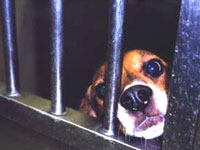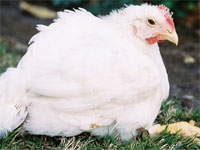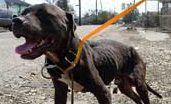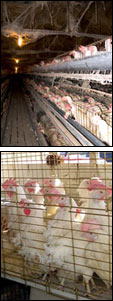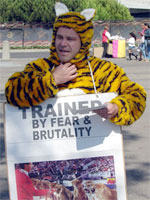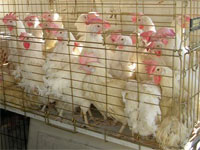Feature Archives
Previous Indybay Coverage of UCSF Animal Issues and Demos: 1 | 2 | 3
EBAA's latest target was Foster Farms’ poultry operations. The group conducted an investigation of Foster Farms' broiler (chicken meat) operations in Merced County, California's top broiler producing county and home of the company’s headquarters. EBAA investigators rescued 39 sick and injured chickens. Following the investigative rescue, EBAA filed an animal cruelty complaint with Merced County Animal Control. Each week Foster Farms slaughters five million chickens for human consumption. In honor of September’s National Chicken Month, EBAA is calling on Foster Farms to discontinue its misleading "Pure Honest to Goodness" marketing campaign and improve conditions for its birds. "Foster Facts" Report
EBAA's Recent Investigations/Exposés:
Turkey-Production.com
InsideDairyProduction.com
Free-Range-Turkey.com
Cal-Eggs.com
FosterFacts.net
Coming Face to Face with Industrial Animal Confinement: A Journey Into The Darkness
Previous Indybay Features on EBAA Activities:
True Price of Milk | Inside an Open Rescue | Countering "Happy Cow" Ads | Great American Meatout | Veg Feed-in | Freeing Turkeys
Many people have been separated from their companion animals, and others have refused to leave their homes because they are not ensured security for the animals. Many people who were rescued from floodwaters were forced to leave behind their beloved animal companions. Many have heard the story of the dog "Snowball", taken by a police officer from the arms of a little boy who was waiting for a bus to the Houston Astrodome. The boy cried until he vomited. A man at the Superdome reported being forced to leave his cat, understanding that he would be arrested if he did not. Many poor pet owners were unable to evacuate the city prior to the hurricane. After people have refused to leave their animals behind, they have faced armed police and threats of arrest under mandatory evacuation order. Humane Society President Wayne Pacelle and others have declared that a national animal-rescue policy is needed.
In some areas, the army has reportedly begun to assist with rescue efforts but it is unclear as to whether this is policy or if this is a voluntary effort of a small number of soldiers. Many National Guard soldiers have been upset at the current orders to specifically not rescue animals. Other law enforcement has not been so kind, as a sheriff in the town of St. Bernard's Parish was caught on videotape shooting stranded dogs in the street.
Rescue efforts continue — despite shortages of volunteers and supplies — and some people have been trying to keep animals alive until their owners are able to return or they can be rescued. They have reportedly been leaving food and water for animals in the street, and trying to leave food in as many houses as possible where animals have been witnessed or reported, to keep them alive. Animal advocates urge that people call the individuals and agencies who could help to make animal rescue more of a priority. People in the Bay Area have been taking in animals from the Gulf Coast — some 550 rescued dogs began arriving in Marin County this week and are to be housed throughout the Bay Area.
Updates: September 19th from Gonzales Shelter | Alert from HSUS | Time Is Running Out | September 13th Update | September 9th Roundup of Animal Coverage | September 8th Media Report | September 2nd Report
What You Can Do to Help: Begging for Help in Gonzales | Volunteers Needed in Gonzales, LA | Bay Area Shelters Needing Your Help | Kinship Circle | Pasado's Safe Haven | Noah's Wish | Best Friends | Humane Society of the United States | Helping Animals | PetFinder.com | United Animal Nations | Contact Government Officials and the Corporate Media
A massive rescue effort by local animal protection groups initially hoping to save 300 hens from an egg farm has freed 1,800 lucky birds. While that’s only a little more than one percent of the 160,000 white leghorn hens who populated the egg factory farm in Santa Clara County, California, it is still a substantial number. Moreover, this may be the first time in California that agribusiness has allowed groups to come onto a factory farm to save as many animals as they can carry while documenting the process. Leading the weeklong liberation that began on August 13 was Animal Place, a farmed-animal sanctuary in Vacaville, about 45 miles northeast of San Francisco. Kim Sturla, Animal Place’s director, worked with other local organizations to coordinate the rescue and find homes for the hens. Sturla says those groups included the Center for Animal Protection and Education (CAPE) of Santa Cruz, East Bay Animal Advocates of Oakland, the Marin Humane Society, Viva!USA of Davis, United Animal Nations of Sacramento, and many others. “This is really the first rescue of its kind,” said Sturla. “We had permission to go in and bring out as many hens as we possibly could. To accomplish this, we had some amazing cooperation among local sanctuaries and humane societies. And now we’re getting tremendous support from the public. Because of this rescue, many people are just learning about the horrors these birds suffer, and they are opening their hearts and homes to them.” Read More
8/16: Local Sanctuaries Rescue Hundreds of Hens
It began with a phone call from PETA’s Bruce Friedrich. An egg farmer in California’s Central Valley had 160,000 “spent” hens he was about to send to slaughter. In other words, they’d been exploited to the point where their eggs were no longer valuable, so, after less than two years of life, it was time to move them out. Since he’d only get a penny each for them (they’d end up as dog and cat food), the farmer had told PETA they could take as many as they wanted. With the help of Animal Place and other rescuers, around 700 hens were saved and most have found good homes. Rescuers are asking for help in placing the last of the hens in suitable homes. Read More with Photos
As the nation's largest dairy producer, California serves as the benchmark for industry standards and norms. Annually, the Golden State generates $4.6 billion in revenue from 1.5 million cows at 2,400 farm operations. According to the California Department of Food and Agriculture, one out of every five dairy cows in the United States is raised in California. Despite exceptional economic and agriculture growth, California's dairy practices have a detrimental effect on animal welfare, environmental sustainability, public health, and occupational safety. Read More
Other Recent Reports Related to Dairy and Dairy Farms:
1 | 2 | 3 | 4 | 5 | 6 | 7 | 8
Oakland Reports and Pictures: 1 | 2 | 3
San Jose Report: 1
Full Bay Area Leafletting Schedule
Previous coverage of July 2005 Ringling demos in Fresno
Information on Animals in Circuses: Circuses.com


